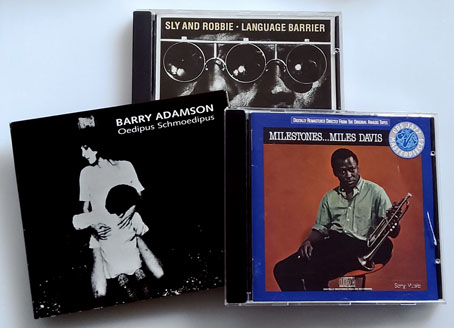
I listen to music all the time when I’m working but it’s not always a good idea to give new music an airing when you’re also concentrating on new work. What often happens on these occasions is that the album will fail to make an impression and end up being laid aside in favour of more familiar sounds, which is what happened to the copy of Milestones (1958) by Miles Davis that I bought last year in a charity shop. Listening to it again this week provoked a “Wow!” response as well as making me realise that I’d heard the tune of the fourth track, Miles, somewhere before. Miles, or Milestones as it’s confusingly also known, is covered by Barry Adamson on his 1996 album, Oedipus Schmoedipus, a simpler version but still jazzier than everything else on the album. I’d always suspected that Adamson was referring to Miles Davis with the title but since I’d never looked at the writing credits until this week I didn’t make the connection. Davis had a habit of naming new pieces of music after people he knew—John McLaughlin, Billy Preston, Mtume, producer Teo Macero, etc—so Miles (as opposed to Milestones) can be taken as an early example of the habit even though it refers to him and also doubles as a reference to measurement rather than a person.
The same title, but not the same piece of music, appears on a 1985 album by Sly & Robbie, Language Barrier, the track in this case being a renamed reworking of Black Satin from Miles Davis’s On The Corner album. Language Barrier in turn was produced by Bill Laswell who later remixed the original Black Satin for his excellent compilation/reconstruction of Davis’s electric period, Panthalassa, and who may have suggested that Sly & Robbie record their own version of the Davis piece. Whatever its origin, Miles (Black Satin) is credited to “B. Laswell, M. Davis, R. Shakespeare & S. Dunbar” which brings us back to Barry Adamson whose Miles has a similar credit at Discogs (but not on my CD…) although Laswell is now (bizarrely) “William Laswell”. I still don’t know what connection Laswell or Sly & Robbie have with Adamson’s track, unless it’s a Discogs error or contains a sample I’ve missed, but the ghost of M. Davis might at least be satisfied that he was influencing popular music after so many years on the outside looking in. Always miles ahead. And that’s the title of another Davis album I’ve yet to acquire…
